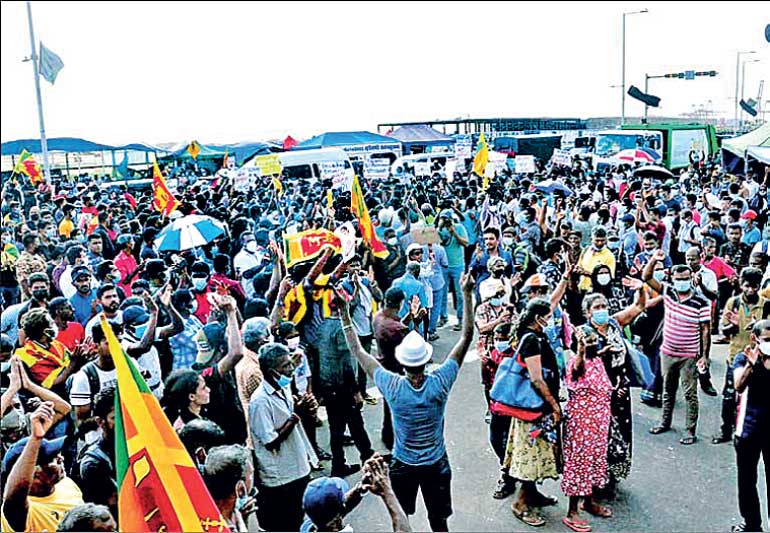Saturday Feb 21, 2026
Saturday Feb 21, 2026
Tuesday, 19 July 2022 00:10 - - {{hitsCtrl.values.hits}}

 With recent events, the youth of Sri Lanka has shown its efficacy in enacting change to substantial political and social systems in Sri Lanka. A key reason for these mass youth gatherings (Aragalaya) was that people were failing to fulfil their basic human needs and, in order to change this, inherent systemic changes were necessary.
With recent events, the youth of Sri Lanka has shown its efficacy in enacting change to substantial political and social systems in Sri Lanka. A key reason for these mass youth gatherings (Aragalaya) was that people were failing to fulfil their basic human needs and, in order to change this, inherent systemic changes were necessary.
However, now a window of opportunity has opened for future generations to change the way in which their country operates. The issues start here because choosing a correct group of people to run the country and bring it back to its former normality is needed. A nation in a crisis with negative growth levels and a debt of over $ 50 billion is not easy to revive. But fortunately Sri Lanka is a resource-rich country which has a very strong private sector and SME sector, therefore if the incoming politicians correctly identify the issues of the people and support this, positive system changes are possible by some time next year.
For this, certain sectors are very important such as the Ministry of Finance, Ministry of Tourism, and ministries concerned with power and energy, foreign employment, justice/defence, economic development and trade. A diverse consultative committee consisting of professionals in respective fields, politicians, youth and such are required to advise each of these ministries.
Therefore Sri Lankan youth would find it advisable to make sure that experienced, honest, knowledgeable and efficient people are appointed posts in these places.
Further, ambassadors can do a lot. They should be encouraged to work to the best of their abilities and see what can be done with their appointed nations in terms of building strong international relationships, as well as bringing in opportunities for Sri Lankan trade, business and tourism. The incoming finance minister has a lot to do as well in improving the dollar income, treasury, restructuring of loans, IMF discussions, rebuilding a secure banking system in the country, reduction of unnecessary expenditures an making all government departments efficient and profitable and supporting entrepreneurs and the SME sector.
So should the respective ministries of agriculture and public transport sufficiently support farmers to sort of food scarcity issues, design a self-sustainable system for each Sri Lankan citizen and ensure that only necessary and useful developments or ventures are undertaken in Sri Lanka.
A methodology for an uninterrupted supply chain is also necessary. Exporters should be supported and the manufacturing of imported items in Sri Lanka should be encouraged. In parallel it would be of good use for national resources to be added in value and gain maximum profitability and usage, while foreign employment also becomes value added via training and such for superior service exports.
A number of longstanding issues still remain, which has proven detrimental to national progress yet have been near impossible to eradicate. Namely,
The younger generations of Sri Lanka may be able to do what many before them have failed to do and resolve these fundamental issues to an extent and tilt our current negative GDP to a positive one.
In this context a self-sufficient population can be built. Each family in a specific ‘grama niladhari’ division should be identified and provided with a self-sustainable system. Via ‘grama sanwardena’ committees, the area’s resources can be used to give the community the ability to bear its own weight. Many problems can be attributed to the absence of national policy. The points of advice aforementioned hope to guide the development of a national policy within the next year outlining the future pathways of the nation.
(The writer has over 30 years of experience in Civil Engineering, and holds a B.E (India) T. Eng. (CEl), MIE (Lon.) MBA (UK) FIIM (HK), FCIOB (Ceylon) Ph.D (U.S.A). In the field of Construction, he is: Ceylon Institute of Builders President, AKK Engineers Ltd. Chairman, Master Builders International Ltd. Chairman, Hybrid Airport Ltd. Chairman, National Construction Association of Sri Lanka Past President, South Asian Lean Construction Association President. In the corporate sector he is: Arpico Finance Past Chairman, Association Motor Finance Past Chairman, Hatton National Bank Sithma Director and in the Leisure Sector: Pinthaliya Resorts & Spa Chairman, Wana Niwahana Holiday Resort Chairman, Wild Ceylon Adventures Chairman, HR & Training Overseas Training Academy Chairman, Human Resource Development Ltd. Chairman. He is also the advisor to several government assignments.)